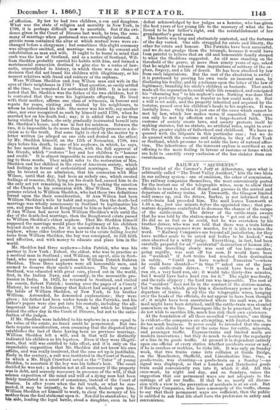RAILWAY " CIDENTS."
THE verdict of the Coroner's Juf at Atherstone, upon what is arbitrarily called "The Trent Valley Accident," hits the two blots in our railway system : one of omission, the other of commission. The railway companies themselves, the most conveniently posted. for the instant use of the telegraphic wires, seem to allow their officials to trust to rules of thumb and guesses in the arrival and departure of railway trains. At Tamworth, the Glasgow limited mail comes up, and the driver, Barber, is not informed that a cattle-train had preceded him. The mail leaves Tamworth at 1.58 a. m., just one minute before the appointed time ; that pre- mature departure contributed to decrease the chance of the escape of the cattle-train. The driver of the cattle-train swears that he was told by the station-master to "get out of the road." He did so as fast as he could, but he was overtaken by his brother driver, who was not told that there was a train before him. The consequences were murder, for it is idle to mince the word. " Railway Companies are beyond all jurisdiction, for they have neither souls to be saved nor bodies to be kicked," was once observed by a witty judge. Everything, in fact, had been carefully prepared for an " accidental" destruction of human life; one train travelling slowly was sent off too late—another, going rapidly, was sent off too soon. It would have been an "accident" if both trains had reached their destination in safety. " Could you have reached Nuneaton "—where he could have shunted—" in time ?" asked one of the jury of the cattle-train driver. "It would have been a hard. run sir, a very hard run, sir ; it would take thirty-five minutes, but I would have had a hard run for it." The night was frosty, and the rails slippery ; the hard run was impossible. The root of the " accident " does not lie in the conduct of the station-master, but in the rule, which gives him a discretionary power as to the departure of trains. In all this the telegraphic wires, hanging over the heads of the officials, do not appear to have been thought of ; it might have been ascertained where the mail was, or the mail might have been detained, until the cattle-train was shunted somewhere on the line. Passengers like to be punctual, but they do not wish to sacrifice life, much less risk their own existences.
At the foundation of all these so-called "accidents," one thing is evident—the companies are attempting, with limited means, to do too much business. It never could be intended that the same line of rails should be used at the same time for cattle, minerals, and passenger traffic. Express-trains and limited mails are modern innovations ; but they do much to destroy the regularity of a line in its goods traffic. At present it is dependent entirely upon one official at every station whether accidents occur or not ; if he is careless or reckless, he risks life. It was only on Sunday week, that two trains came into collision at Guide Bridge, on the Manchester, Sheffield, and Lincolnshire line. One, a goods-train, was shunting—a goods-train on a Sunday !—no signal was displayed, so that a London and Manchester goods train could conveniently run into it, which it did. All this over-work, by night and day, and on Sundays, raises the suggestion that our permanent ways are not adequate to the carriage of all our traffic. If that be so, nearly all discus- sion with a view to the prevention of accidents is at an end. But if Railway Companies, who have a monopoly of the traffic, choose to say that their permanent ways are sufficient, then the public is entitled to ask that life shall have the preference in safety and. convenience.


























 Previous page
Previous page